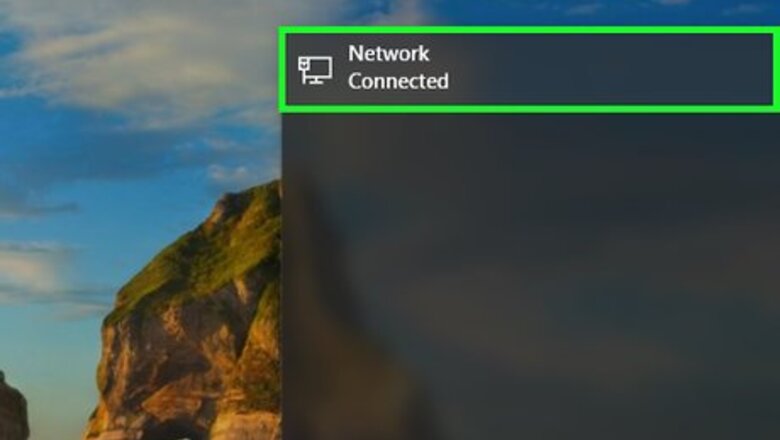
views
Using Windows 10 or 11
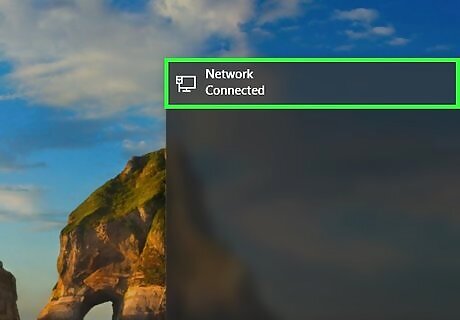
Configure your devices on the network. When sharing internet through your network, it will require a slightly different layout than a standard network. The basic layout is as follows: Connect the computer that is sharing the connection (the "host") to the broadband modem via Ethernet or 4G hotspot via USB. If you are connecting a modem to the host computer via Ethernet, it will need two Ethernet ports (one to connect to the modem, and the other to connect to the hub or router). Connect the host computer to the WAN port of a wired hub or wireless router using an Ethernet cable. Connect the other computers to the hub or router using Ethernet or a wireless signal. Note that the connecting computers don't need any special settings, and can be running any operating system. If you're just connecting two computers, connect them directly via Ethernet.
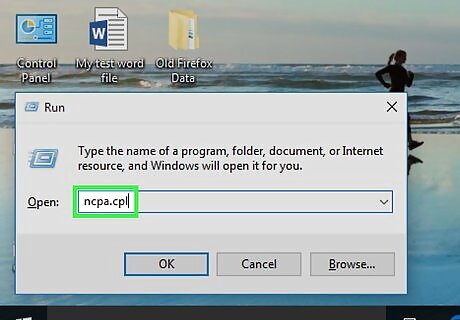
Open the Network Connections window on the host computer. You can quickly open this window by pressing the Windows key + R and typing ncpa.cpl.
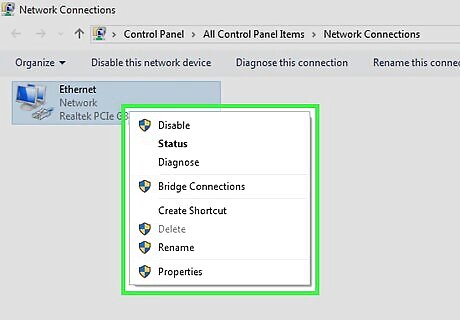
Right-click on the adapter that is connected to the internet source. This could be your modem or your USB hotspot. Make sure that you are only performing these steps on the adapter that is actually connected to the internet, not the adapter that will be connecting the host to the rest of the network.
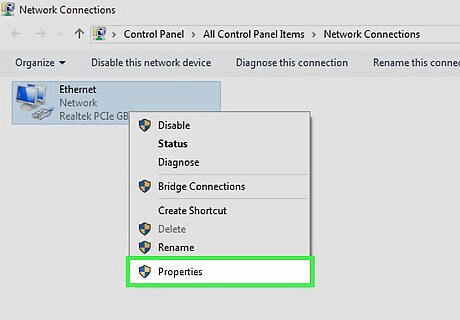
Select Properties and click the .Sharing tab. The "Properties" option is at the bottom of the context menu that appears when you right-click your network adapter. Then click the Sharing tab.
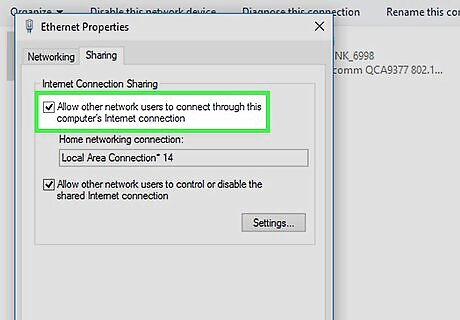
Allow other network users to connect to your computer. To do so, check the "Allow other network users to connect through this computer's Internet connection" box. Then click Apply to save your changes.
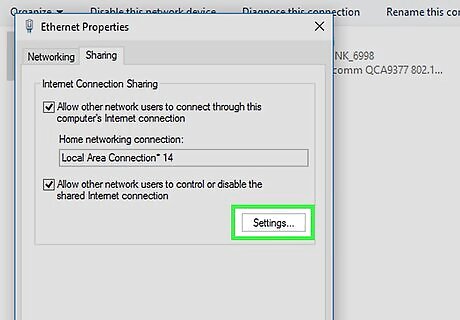
Click the .Settings… button to enable specific services. This is important if the other computers need to access email, FTP, or other special services. Check the box for each service that you want to enable.
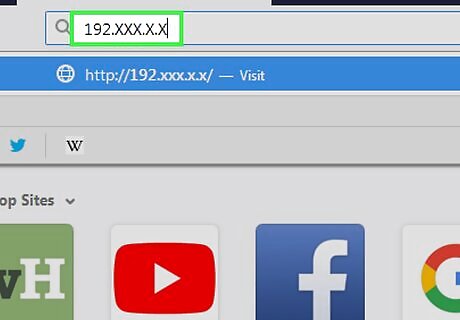
Open your wireless router's configuration page. Now that the host computer is set up, you'll need to configure the router to allow it to pass the connection through. Enter your router's IP address into a web browser and then log in with the admin username and password. If you're using a hub or switch, you won't need to perform any additional configuration.
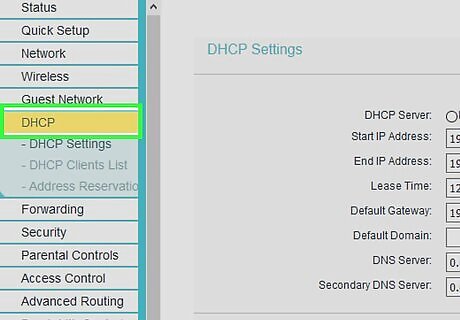
Open the Internet Settings page on the router. The exact wording will vary from one router or modem model to another.
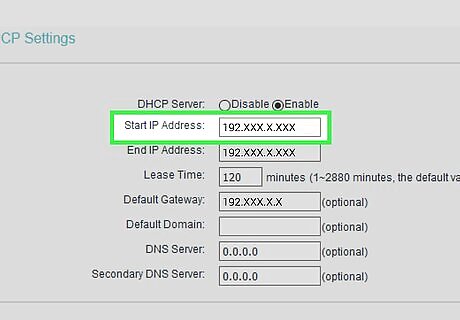
Ensure that the "IP Address" section is set to "Get Automatically". Again, the wording will vary slightly depending on your exact router.
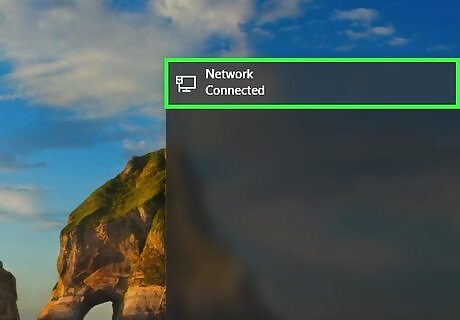
Connect your other computers and devices to the router or hub. Your host and router have been configured, and now it's time to connect your other devices. If connecting via Ethernet, connect each additional computer to the LAN ports on the router or hub. If connecting wirelessly, connect to the router as if you were connecting to any wireless network.
Using Mobile Hotspot on Windows
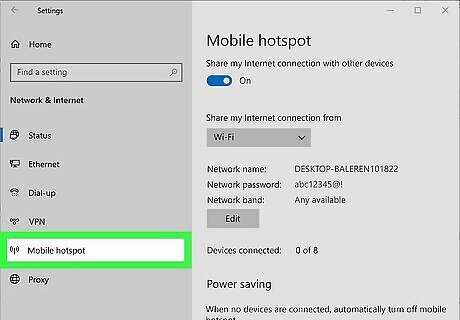
Open the mobile hotspot settings. If your computer is connected to the internet via a mobile data plan (4G or 5G) or an ethernet connection, this method allows you to share your internet connection with another device using Wi-Fi or Bluetooth. You can find the mobile hotspot settings in the Settings menu. Use the following steps to navigate to it. Click the Windows Start menu. Type mobile hotspot. Click Mobile Hotspot in the search results.
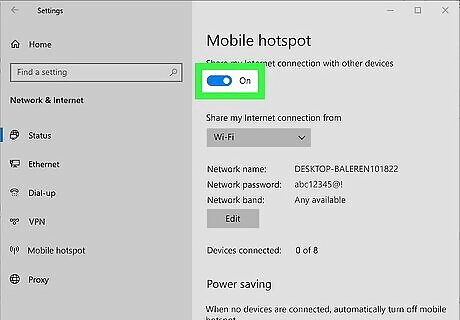
Click the toggle switch next to "Mobile hotspot." This activates mobile hotspot on your PC and allows you to share your internet connection over Wi-Fi or Bluetooth.
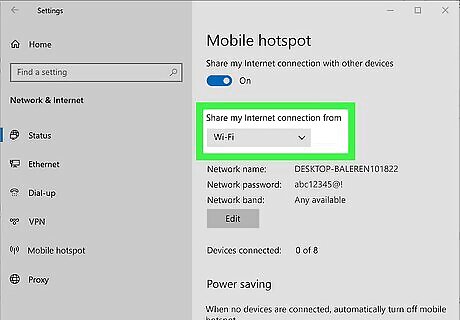
Select how you want to share your internet connection. Use the drop-down menu next to "Share over" to select how you want to share your internet connection. You can share it over Wi-Fi or Bluetooth. Wi-Fi is the quicker option; Bluetooth is pretty slow.
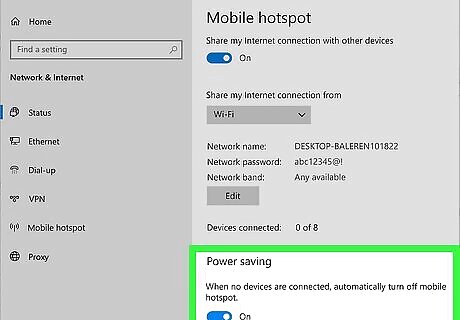
Select if you want Power Saving on or off. If Power Saving is turned on, the mobile hotspot will turn off automatically if no devices are connected. Click the toggle switch next to Power Saving to turn power saving on or off.
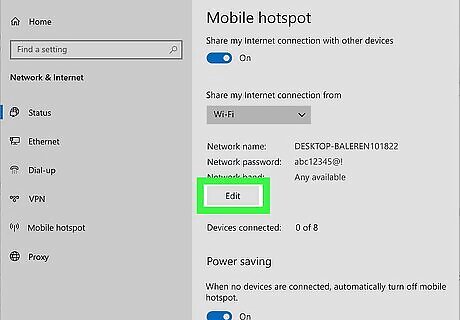
Click Edit next to "Network Properties." This opens a new window that allows you to edit your hotspot network information.
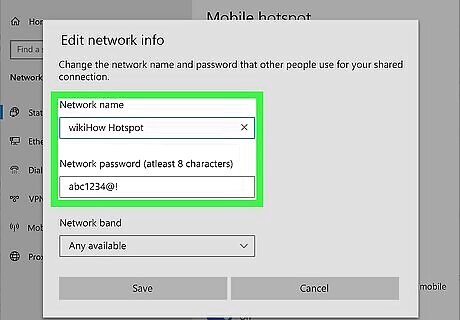
Enter a network name and password. By default, the network name will be the same as your computer name. Your network password will be chosen at random. If you want to change the network name or password, enter a new name next to "Network name" or "Network password."
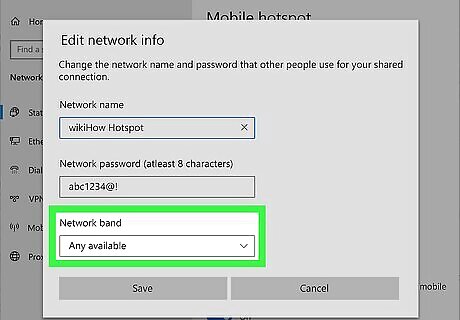
Select a network band. Depending on what your network adapter is capable of, you can either select "2.4 GHz," "5 GHz," or "Any available."
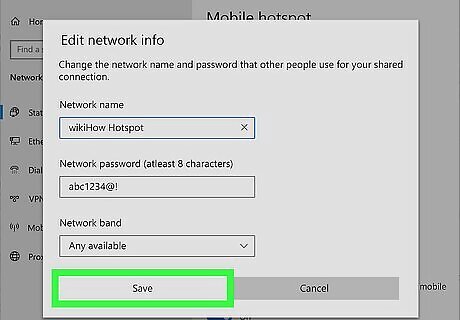
Click Save. This saves your mobile hotspot settings. You can now connect to the mobile hotspot internet connection that your PC is transmitting like you would connect to any other Wi-Fi network.
Using a Mac
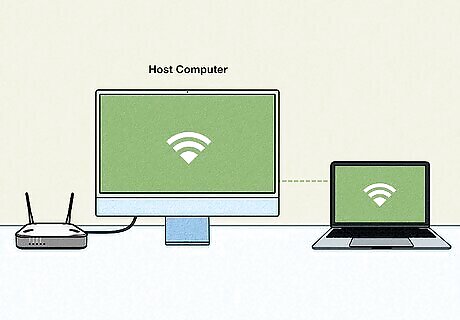
Understand the ways you can share your connection. MacOS's Sharing menu allows you to easily share your Mac's internet connection using any of your installed network adapters. The computer sharing the network is called the "host" computer. You will need at least two network adapters installed in the host to share your connection; one to connect to the internet, and one to connect to the rest of your network. If you have an unused wireless adapter (for example, your host is connected to the modem via Ethernet), you can use it to create a wireless network that other devices can connect to in order to access the internet. If you have two Ethernet adapters, you can connect one to the modem, and the other to a network switch or router. Your other computers and devices can then connect to this network.
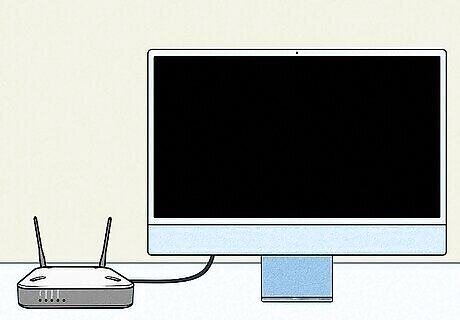
Connect the host computer directly to the internet source. For the best results, it's recommended that you connect the host computer directly to your broadband modem via Ethernet, or use a USB hotspot. If your Mac doesn't have an Ethernet port, you can use a USB or Thunderbolt adapter.
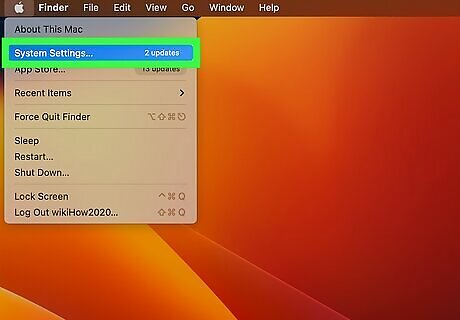
Open the System Preferences or System Settings. To do so, click the Apple icon and select System Preferences or System Settings on newer versions of macOS.
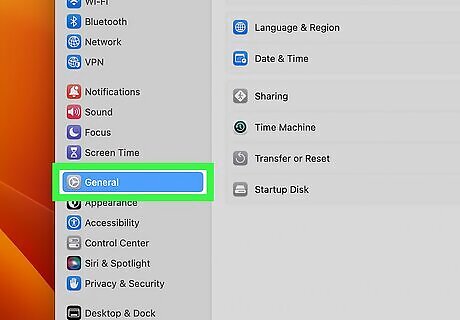
Click General (macOS 13 and higher). If you are using macOS Ventura or higher, click General in the menu bar to the side.
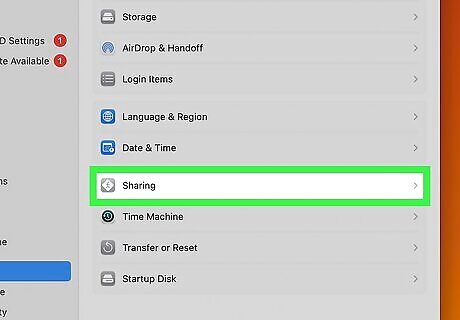
Click the Sharing option. On older versions of macOS, it will be an icon that resembles a blue folder. On newer versions of macOS, it will be in the menu to the right. You may need to scroll down to see it.
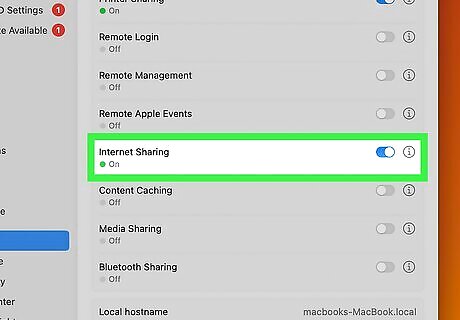
Check the toggle switch next to "Internet Sharing." It's in the main box on the right. This will enable sharing for the host computer's internet connection. On older versions of macOS, you'll need to click the check box next to "Internet sharing."
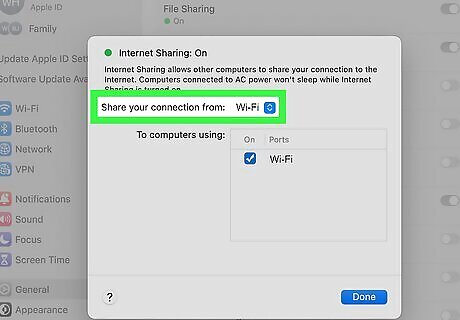
Click the "Share your connection from" menu and select your internet source. If you're connected to your modem via Ethernet, select it from the menu. If you're connected to a USB hotspot, select it instead. Click Start to confirm that you want to enable internet sharing. Note that turning internet connection sharing on will likely disrupt any existing network you have set up. You may need to click the icon that resembles an "i" next to "Internet Sharing" to see this option on newer versions of macOS.
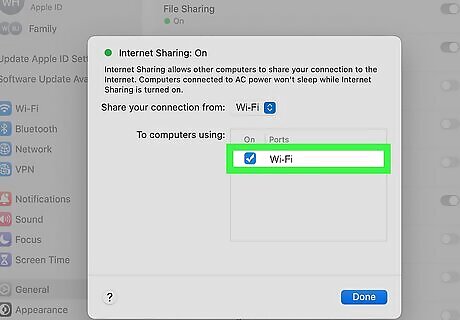
Select the method that you want to use to broadcast your connection. Select this option in the "To computers using..." list. The method you choose depends on the way you want other computers to connect. If you want to turn your Mac into a wireless hotspot, check the "Wi-Fi" box. If you want to connect your Mac to a network hub or wireless router, select "Ethernet".
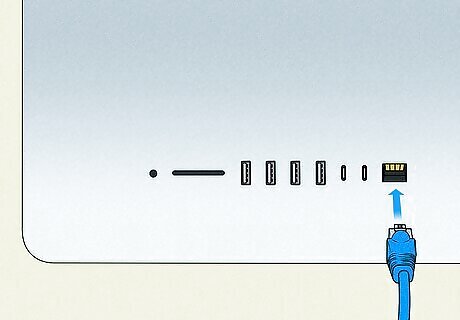
Connect the host Mac to the network hub or router's WAN port (Ethernet). If you opted to share your host's internet connection with a hub or router which the other computers will connect to, use an Ethernet cable and connect your host to the hub's WAN port.
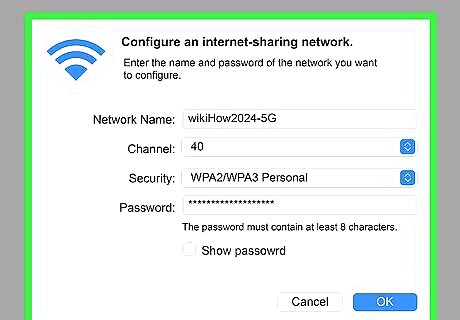
Configure your wireless settings (Wi-Fi). If you decide to turn your Mac into a wireless access point, click the Wi-Fi Options... to set a network name and password for the network. Make sure to select "WPA2/WPA3" as the "Security" type, and create a password that won't be easily guessed. If you're in a crowded living area such as an apartment complex, change the "Channel" to something other than 6 or 11, as these are the two most common ones. Doing so will help reduce interference.
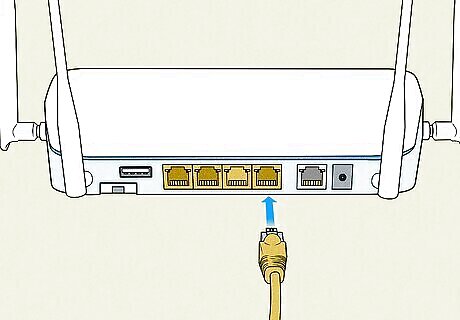
Connect your other computers and devices to the router or hub. Your host Mac is now ready to share its internet connection, and you can connect the other computers and devices as if it was a typical network. If connecting via Ethernet, connect each additional computer to the LAN ports on the router or hub. They should automatically get IP addresses and be able to connect to the internet. If connecting wirelessly, connect to the router as if connecting to any wireless network.
Using Android
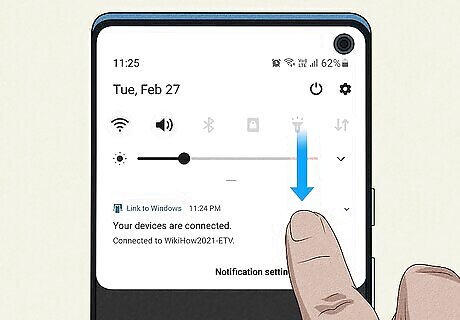
Open the Settings menu. To do so, swipe down from the top of the screen to open the Quick Access menu. If your Android device has a mobile data connection, such as 4G or 5G, you can enable mobile hotspot to share your internet connection with other devices.
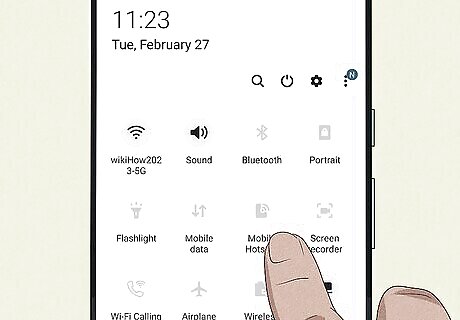
Tap and hold the Hotspot or Mobile Hotspot icon. It's in the Quick Access menu. Alternatively, you can find this option in the Settings menu under "Network & Internet" or "Connections."
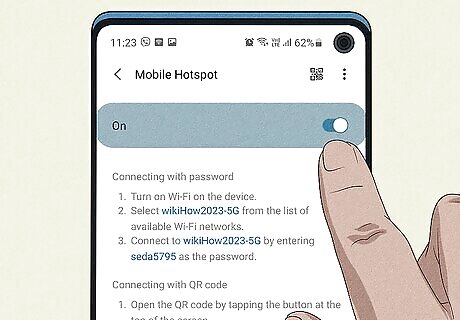
Tap the toggle switch to turn the mobile hotspot on. Tap the toggle switch at the top of the page to enable mobile hotspot. This allows you to connect other devices to your mobile phone via Wi-Fi using the network name and password listed on your Android device's mobile hotspot screen.
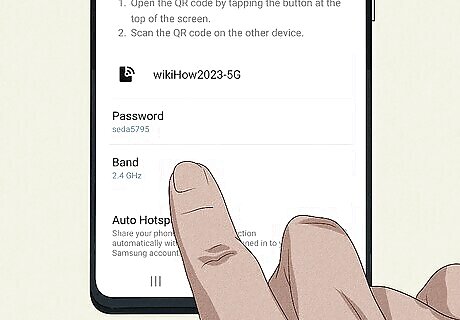
Edit the network name and password (optional). If you want to change the network name or password, tap Network name or Password and enter a new network name and password. Then tap Save.
Using iPhone or iPad
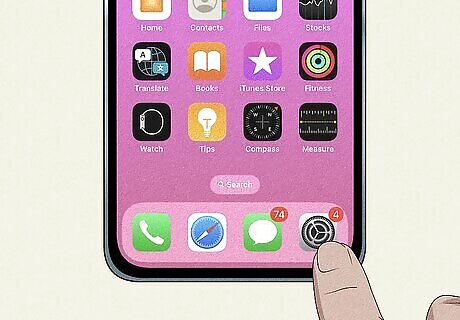
Open the Settings app iPhone Settings App Icon. It has an icon that resembles two gears. If you have a mobile data connection, such as 4G or 5G, you can share your internet connection with other devices using Personal Hotspot.
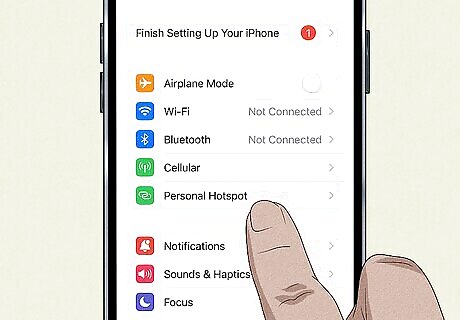
Tap Personal Hotspot. It should be near the top of the menu below "Cellular." If you don't see this option, tap Cellular first. Then tap Personal Hotspot.
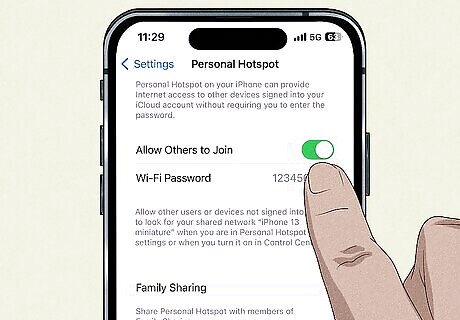
Tap the toggle switch next to "Allow Others to Join." This enables your personal hotspot and allows you to connect other devices to your iPhone or iPad's internet connection using Wi-Fi.
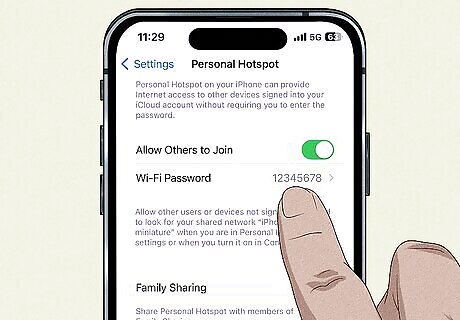
Change your personal hotspot password (optional). By default, your iPhone or iPad will generate a random password that you can use to connect to your personal hotspot. If you want to change the password, tap Wi-Fi Password in the Personal Hotspot settings menu. Enter a new password.
Troubleshooting
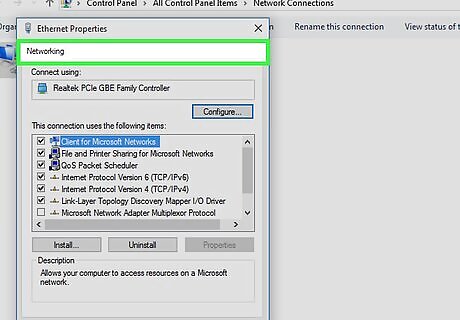
There is no "Sharing" tab. This is typically the case if you only have one network adapter installed. You must have at least two different network adapters installed to use internet connection sharing.
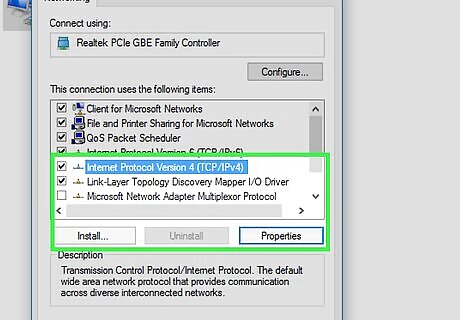
The other computers on the network are not getting an internet connection. This is typically caused by the computer not getting a correct IP address. Make sure that you only have internet connection sharing enabled on the host computer, and only on the adapter that's connected to the internet. All of the other computers on the network should not have internet connection sharing enabled. Open the Network Connections window on the computer that cannot get an internet connection. To do so, press the Windows key + R and then type ncpa.cpl. Right-click on the network adapter and select Properties. Select "Internet Protocol Version 4 (TCP/IPv4)" and click Properties. Select "Obtain IP address automatically". Repeat for "Internet Protocol Version 6 (TCP/IPv6)".
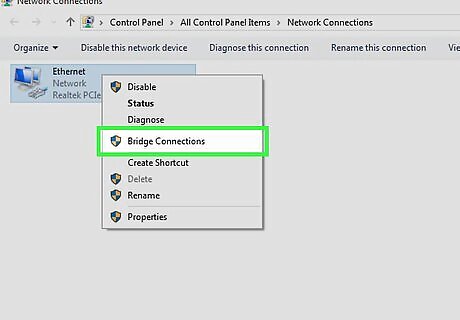
The other computers can share files but cannot connect to the internet. Bridging your two network adapters may help solve this problem. Open the Network Connections window on the host computer (the Windows key + R and then type ncpa.cpl). Select the two adapters that you want to bridge. This should be the adapter that is connected to the internet and the adapter that is connected to the rest of the network. Hold Ctrl and click each one to select them. Right-click on one of the two selected networks and select "Bridge Connections". Click Yes when prompted. Reboot the other computer and try connecting again.
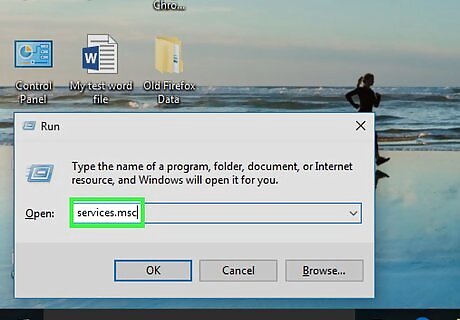
I'm receiving the "An error occurred while Internet Connection Sharing was being enabled. (null)" message. This can be caused by a problem with the internet sharing services in Windows. Press the Windows key + R and type services.msc. Press Enter to open the Services window. Find each of the following services: Application Layer Gateway Service Network Connections Network Location Awareness (NLA) Plug And Play Remote Access Auto Connection Manager Remote Access Connection Manager Remote Procedure Call (RPC) Telephony Windows Firewall Double-click each service and set the "Startup Type" to "Automatic". Reboot the computer after setting each service and try the connection again.
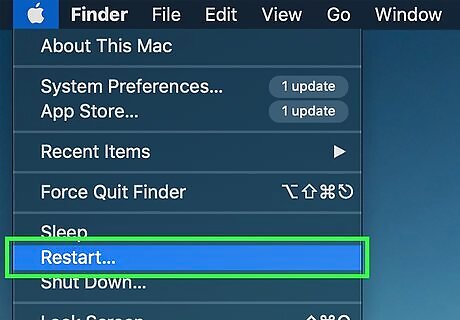
My other devices are not able to get an internet connection. This will often occur if you've made changes to the sharing settings after enabling the wireless network. The quickest way to try to fix this problem is by disabling Internet Sharing, restarting the computer, and then re-enabling it and creating a new wireless network.



















Comments
0 comment